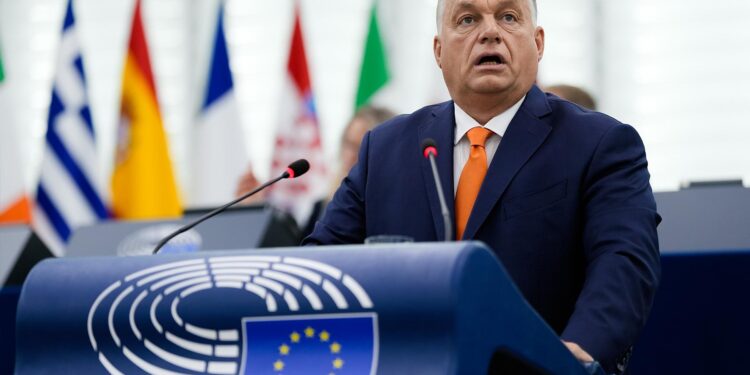Hungary’s Prime Minister Viktor Orbán is intensifying efforts to persuade the European Union and the United States to reconsider sanctions imposed on Russian oil, a move that aligns with former President Donald Trump’s more conciliatory approach toward Moscow. As energy prices surge across Europe amid ongoing geopolitical tensions, Orbán’s lobbying highlights deep divisions within the EU over how to balance economic interests with diplomatic pressure on Russia. This development adds a new dimension to the already complex transatlantic dialogue on energy security and sanctions policy, as reported by Euronews.
Hungary’s Viktor Orbán Challenges Western Sanctions on Russian Oil
Hungarian Prime Minister Viktor Orbán has intensified his opposition against Western-imposed sanctions targeting Russian oil exports. As the European Union maintains a unified stance on restricting energy imports from Russia, Orbán argues that these measures disproportionately impact Hungary’s economy, which is heavily reliant on Russian energy supplies. He advocates for a revision of the current sanctions regime, pushing for exemptions or modifications that would allow Budapest to continue purchasing Russian oil without falling foul of EU policies.
In his recent statements, Orbán emphasized several key points underpinning Hungary’s position:
- Energy security: Hungary’s dependence on Russian oil necessitates a pragmatic approach to sanctions.
- Economic stability: Restrictive policies risk driving inflation and economic downturn domestically.
- Sovereignty concerns: Orbán insists Budapest should have the freedom to safeguard its national interests.
| Aspect | Hungary’s Position | Western Sanction Policy |
|---|---|---|
| Oil Import Sources | Predominantly Russian | Diversification encouraged |
| Economic Impact | Potentially severe | Trade-off accepted |
| Policy Flexibility | Seeks exemptions | Minimal tolerance |
Economic and Political Motivations Behind Orbán’s Campaign
At the core of Viktor Orbán’s recent diplomatic efforts lies a complex interplay of economic interests and political strategy. Hungary’s heavy reliance on Russian oil imports-accounting for nearly 65% of its total energy consumption-creates a fragile energy security position that the sanctions threaten to destabilize. By pushing for a rollback of the sanctions, Orbán aims to safeguard Hungary’s industrial base and keep energy prices manageable for consumers, a move that resonates deeply with his domestic electorate concerned about rising living costs. This economic lens fuels Orbán’s insistence that sanctions should not inadvertently punish energy-dependent nations within the European Union.
Politically, Orbán’s campaign can be interpreted as an assertive bid to position Hungary as a key interlocutor between East and West, amplifying his image as a pragmatic leader who prioritizes national interests over bloc-wide consensus. His approach leverages nuanced diplomatic pressure on Brussels and Washington, emphasizing:
- Energy autonomy for Central European countries
- Resistance to external economic coercion
- The promotion of a multipolar geopolitical order
This strategy not only underpins Orbán’s geopolitical posture but also reinforces his domestic narrative of protecting Hungary from external interference, a message that garners notable support among his political base ahead of upcoming elections.
| Factor | Impact on Hungary |
|---|---|
| Russian Oil Dependency | High (65%) |
| Energy Price Inflation | Major domestic concern |
| Political Narrative | National sovereignty emphasized |
| EU Relations | Tense but strategic |
Experts Urge Balanced Approach Amid Growing East-West Energy Tensions
Energy analysts and geopolitical experts emphasize the need for a nuanced strategy as tensions rise between Eastern and Western powers over energy security. The ongoing sanctions on Russian oil, initially imposed under the Trump administration, have sparked debates across European capitals, with Hungary’s Prime Minister Viktor Orbán spearheading efforts to advocate for their reversal. Critics argue that lifting these sanctions could undermine unified Western pressure, yet supporters contend that easing restrictions may stabilize energy markets and prevent further economic fallout.
In the midst of this complex landscape, specialists urge policymakers to consider a balanced approach that safeguards both economic interests and geopolitical stability. Key factors influencing the debate include:
- Energy supply diversification: Reducing dependence on any single source to minimize vulnerabilities.
- Market volatility control: Addressing price spikes that disproportionately affect vulnerable economies.
- Diplomatic channel maintenance: Keeping open dialogue between East and West to avoid escalations.
| Aspect | Western Perspective | Eastern Perspective |
|---|---|---|
| Sanction Impact | Strategic pressure tool | Economic strain, calls for relief |
| Energy Security | Diversification priority | Need for steady supply |
| Diplomatic Focus | Maintaining unity | Seeking engagement |
In Conclusion
As Hungary’s Prime Minister Viktor Orbán intensifies his efforts to overturn EU sanctions on Russian oil, the move highlights ongoing divisions within the bloc over energy policy and relations with Moscow. With the debate set to continue in Brussels, Orbán’s push underscores the complex balancing act facing European leaders amid geopolitical tensions and economic pressures. Euronews will continue to monitor developments as the situation evolves.















